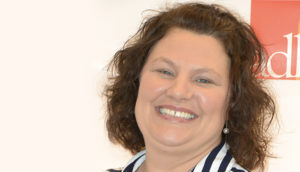
Pushing the Profession Forward
Crystal Adams, MA, CDA, RDH, helped North Carolina eliminate the prior exam law and sees a bright future for dental hygiene.
 It started with the realization that she wanted a career that involved helping people. Through that desire, Hickory, North Carolina-based Crystal Adams, MA, CDA, RDH, found her way into the field of oral health. She first worked as a certified dental assistant, but hungry for more, decided to attend dental hygiene school. After working in private practice, Adams became a part-time clinical instructor at Catawba Valley Community College, where she is now the director of the department of dental hygiene.
It started with the realization that she wanted a career that involved helping people. Through that desire, Hickory, North Carolina-based Crystal Adams, MA, CDA, RDH, found her way into the field of oral health. She first worked as a certified dental assistant, but hungry for more, decided to attend dental hygiene school. After working in private practice, Adams became a part-time clinical instructor at Catawba Valley Community College, where she is now the director of the department of dental hygiene.
We caught up with Adams recently to hear her views on current topics impacting the profession of dental hygiene.
Q: As an educator, what do you see as the greatest challenges facing graduating dental hygienists today as they enter the workforce?
A: One of the biggest problems is not having enough time for treating patients. Dental hygiene care continues to expand to include more responsibilities, which can put pressure on a clinician to complete comprehensive care for each patient. In spite of time constraints, I advise my students to always treat patients as they would treat their own family members and to provide optimal, evidence-based care.
Q: North Carolina was one of the last states to have a prior exam law. You were involved in getting it struck down. Can you explain this law, how it hindered access to care, and how you were able to work with organized dentistry to overturn it?
A: The prior exam rule required a dentist to examine patients before they could receive care by a public health dental hygienist. This rule inhibited a dental hygienist from performing preventive care in rural care areas with dentist shortages. In 2018, the North Carolina Dental Society formed the Council on Oral Health and Prevention to address dental care and preventive issues for North Carolinians in need. Through this partnership, which involved multiple organizations, rule 21 NCAC 16 W .0101 was amended to remove the prior exam rule.
The new rule allows public health dental hygienists to perform procedures in numerous settings in dental-access-shortage areas under the direction of a dentist, but without the need for a prior evaluation by the dentist.
Q: Expanded scope of practice for dental hygienists remains a contentious issue in some states. What do you foresee for the dental hygiene profession going forward in this regard?
A: I believe dental hygienists will continue to see changes to dental hygiene practice acts in many states, especially with discussions of medical-dental integration continuing to gain momentum. This is an exciting time to be part of the dental hygiene profession.

